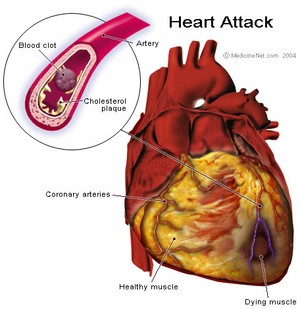Light to moderate regular drinking seems to offer some heart protective benefits, (although recent research is confusing the issue) and for most people, this level of drinking won't cause significant heart disease risks.
Heavy drinking is very associated with heart disease and an increased risk of death by heart attack or stroke. One primary way that alcohol increases the risk of heart disease is through the effects of heavy drinking on blood pressure.
What Is Blood Pressure?
Blood pressure is the measured force of the blood pumping through the arteries. High blood pressure means that the heart needs to use greater force to pump blood around the body. Blood pressure is measured with two markers, systolic pressure and diastolic pressure.
Systolic pressure is the higher numeric score of the two, and this is the measurement taken while the heart is contracting – pumping blood.
Diastolic pressure is the lower numeric score, and this is the measurement taken between heart beats, when the heart is at rest.
What are the Risks of High Blood Pressure?
High Blood pressure affects 1 in 3 adult Americans, and about 40% of those affected do not seek out treatment. High blood pressure causes the heart to work harder, get bigger, and become less able to satisfy the needs of the body.
High blood pressure also increases the hardening of the arteries, increasing the risk of organ disease and blood clots.
High blood pressure increases:
- The risks of a fatal heart attack by 300%
- The risks of a fatal stroke by 400%
- The risks of heart failure by 300%
- The risks of kidney disease by 300%
Why Does Heavy Drinking Increase Blood Pressure?
Doctors aren't exactly sure what role alcohol plays in the development of high blood pressure – but they are very sure that heavy drinking can cause or worsen the condition.
Some hypothesis's include:
- Alcohol causes an increased sympathetic nervous system response, which in turn causes the blood vessels to constrict, and which may play a role in the development of the disorder.
- Alcohol also causes the release of hormones and salts in the blood, hormones such as catecholamines, epinephrine and salts such as magnesium and calcium ions. These hormones and salts are involved in cardiac functioning.
- The period of withdrawal after a binge drinking session can result in dramatic fluctuations in blood pressure, and alcohol may also cause a decreased ability for the body to regulate pressure control mechanisms.
The data does not yet show what mechanisms alcohol uses to drive up blood pressure, but recent research indicates that alcohol may have a greater impact on blood pressure than previously thought, and that alcohol's ability to drive up blood pressure may well eliminate the heart-protective effects that it exerts through increasing good cholesterol levels.
More than a couple of drinks a day greatly increase the odds of high blood pressure, and there is a linear link between greater alcohol consumption and higher blood pressure scores. That is, the more you drink – the higher your blood pressure will tend to be.
A Silent Killer
In many cases, high blood pressure has no symptoms, and unless people get a high blood pressure test, they may have the condition and not ever know of it.
If you are a heavy drinker, and especially if you are over the age of 40, you should see a doctor to get a blood pressure measurement test, and to discuss the influence that your drinking may have on your cardiac health.
If you have high blood pressure, you will need to either quit drinking, or drink only in very real moderation.
Page last updated Apr 07, 2011


